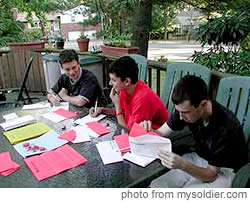When tragedies such as last week’s shooting at Virginia Tech happen, the media pay a lot of attention to the horrible facts, the deaths of so many innocents, the profiles of their lives, and, of course, the suffering of their families. That is certainly appropriate even though heart-wrenching. And last week, we ended up knowing more than we probably wanted to about the mentally disturbed young man who committed the shootings, including those hard-to-watch and spine-chilling videos.
But there is another side of the picture that is often underemphasized. It is that these kinds of tragedies almost always have a way of drawing out the most amazing examples of human compassion, caring, bravery, and even heroism. These are often noted in the media, but not always given the attention they deserve. The late children’s TV show host Mr. Rogers often said, “In a crisis, always look for the helpers.” During the 9/11 tragedy, focusing on the helpers was especially important to my young son Luke. And I would say, in tragedies such as the shootings at Virginia Tech, we should always look for the heroes. It’s a way to discover the best of humanity again in such depressing and dehumanizing situations. Let’s look at a few of the heroes of Virginia Tech.
Prof. Liviu Librescu, 76, grew up in Romania, survived the Holocaust where his family was jailed by the Nazis, and then the dictatorship of Nicolae Ceausescu. But he died at Virginia Tech when, as The New York Times reported,
Professor Librescu never moved from the door of Room 204 in Norris Hall at Virginia Tech, witnesses said, even as the gunman, Cho Seung-Hui, was shooting. Directing his students to escape through windows, Professor Librescu was fatally shot.
Prof. Librescu was buried last Saturday in Israel. His son had this tribute:
“I believe you are looking at us from above, at this gathering, and saying: ‘What, don’t you have anything to do? I did what I had to do,’ ” Arie said. “A hero has to have a combination of characteristics, which you had.”
In a long feature on the day in Blacksburg, The Washington Post told of several students in a German class. After an initial round of shots, the shooter left, then suddenly returned.
[Trey] Perkins and two classmates, Derek O’Dell and Katelyn Carney, ran up to the door and put their feet against it to make sure he could not get back in. They would have used a heavy table, but there were none, and the desks weren’t strong enough. Soon the gunman tried to get back in. The three students pressed against the door with their arms and legs, straining with their lives at stake. Unable to budge the door, the gunman shot through it four times. Splinters flew from the thick wood. The gunman turned away, again.
Then there were the unnamed heroes. Drs. Davis B. Stoeckle and Holly Wheeling were the surgeons in the emergency room of the hospital in Blacksburg. The Post wrote:
As they worked, Stoeckle and Wheeling heard stories of bravery from the wounded: students pushing others into closets to protect them from the barrage of bullets and helping one another with makeshift tourniquets and bandages.
As we continue to mourn those who died, and pray for their families, let’s also celebrate the helpers – the heroes. When tragedies remind us of the worst, saddest, and darkest elements of humanity, it is crucial to also witness and be reminded of the best and most heroic in us as well. Heroism is the moral response to tragedy.

